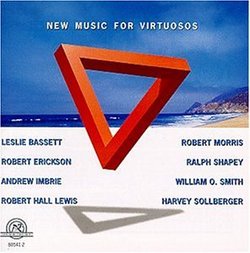| All Artists: Harvey Sollberger, Robert [Liner Notes] Morris, Robert [4] Hall Lewis, Ralph Shapey, Andrew Imbrie, Robert Erickson, William O. Smith, Leslie Bassett, Daniel Shulman, Robert Black, Kevin Aanerud, Ellen Weckler Title: New Music for Virtuosos Members Wishing: 0 Total Copies: 0 Label: New World Records Release Date: 9/29/1998 Genre: Classical Styles: Opera & Classical Vocal, Chamber Music, Historical Periods, Modern, 20th, & 21st Century, Instruments, Reeds & Winds, Symphonies Number of Discs: 1 SwapaCD Credits: 1 UPC: 093228054122 |
Search - Harvey Sollberger, Robert [Liner Notes] Morris, Robert [4] Hall Lewis :: New Music for Virtuosos
 | Harvey Sollberger, Robert [Liner Notes] Morris, Robert [4] Hall Lewis New Music for Virtuosos Genre: Classical
|
Larger Image |
CD Details |
CD ReviewsOpposite reaction A serious listener | Chapel Hill, NC, USA | 03/05/2000 (5 out of 5 stars) "This is a fine example of a various array of different new music. The fact that it has Donald Sinta performing is an extra treat! Only few recordings are available and are extremely hard to find with Donald Sinta on them. The previous feedback left by the other person is obviously uneducated. I am offended by the tasteless comments of the peon." Outstanding Re-release A serious listener | 12/24/2000 (5 out of 5 stars) "Having any available recording of Donald Sinta is a benefit to the musical profession at-large. Needless to say, he is a rare artist who transcends the saxophone genre, and it is unfortunate there isn't more of a recorded legacy of this major performer/teacher. As reflected in the reviews of his work by major critics over the past thirty years, he is indeed one of the most gifted wind soloists ever, and any musician can learn from his artistry. Students of the saxophone 'must' have this important re-release by New World Records to hear how one should play beyond the limitations and aesthetic constraints of this misunderstood classical instrument." Fabulous recording of Basset's Music for Saxophone and Piano A serious listener | 04/17/2001 (5 out of 5 stars) "I am in agreement with some of the other reviewers. Donald Sinta has influenced me and my playing so greatly, I don't know where I would be if I had never come across his wonderful playing, which sounds I have been trying to echo myself."
|

 Track Listings (8) - Disc #1
Track Listings (8) - Disc #1